Introduction
- The Heart failure (HF) is a rising healthcare burden which is common among many admitted patients.
- The project will introduce preventive interventions and measures for HF.
- The approaches would be examined to decrease patient readmissions and increase quality of hospital services on the 30-day readmission assessment.
Explain the aim of the project and the approaches which will be conducted for the research to be successful.
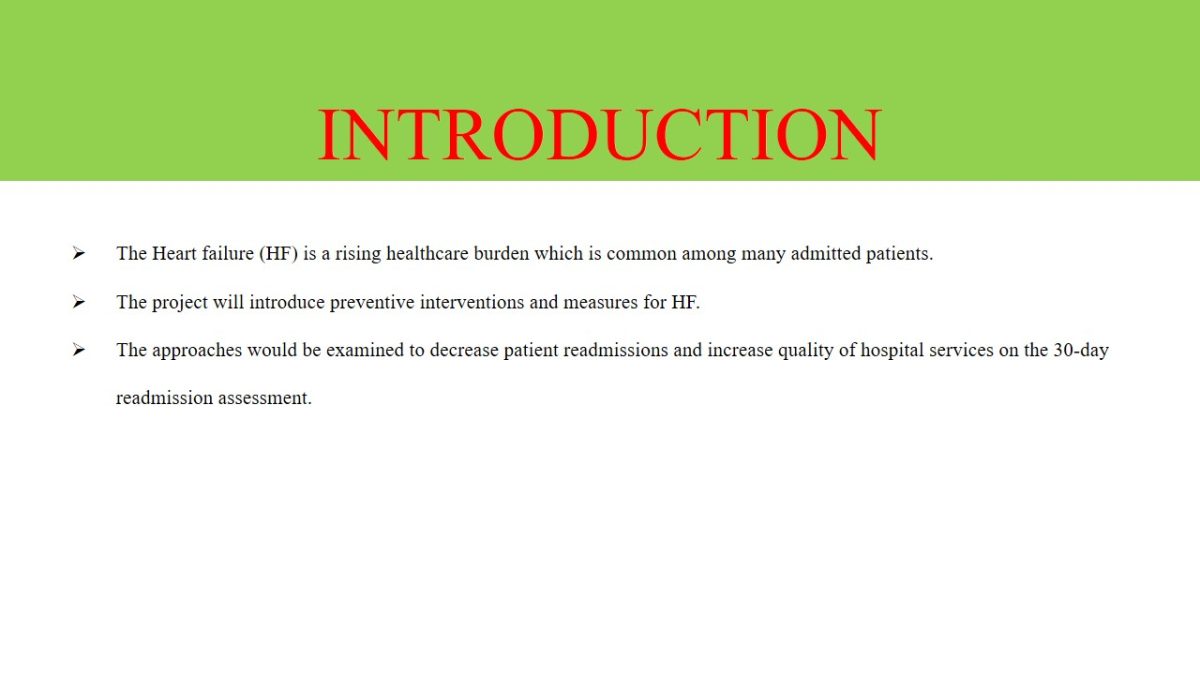
Objective and Intention of the Research
The project aims to assess the mortality, entry, and well-being of individuals with heart disease outcomes from cardiac therapy based on exercise.
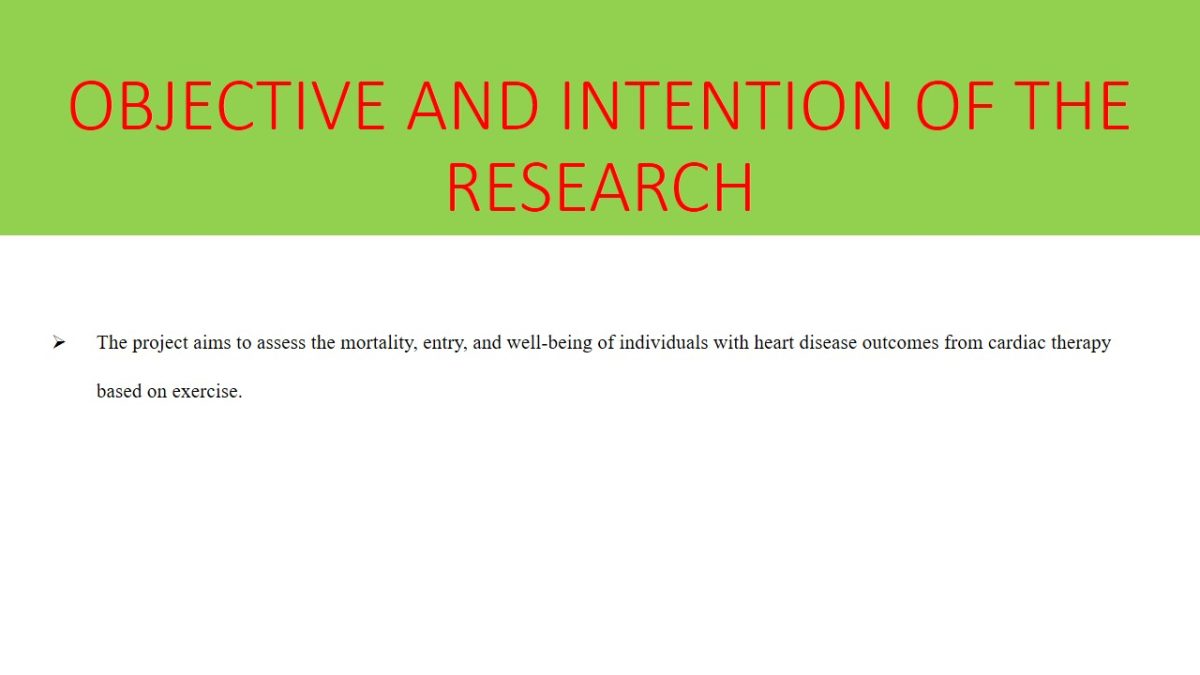
Data Collection Technique And Analysis
The research will include randomized controlled trials (RCTs), conducted at least six months after the randomization, in a parallel or cross-over design.

Criteria for the Review of Studies
Here are different criteria used in the research:
- Study Population: People between 18 to 65 years.
- Types of Interventions: The study covered fitness approaches alone or in systemic cardiac recovery as services with elements such as physical education and psychological interventions. The investigating party is not eligible but could have succeeded (i.e., college, psychiatric surgery) or considered a medical care requirement.
- Outcome Measures: To be considered, one or more findings of the analysis must have been analyzed. Two occasions, up to 12 months of (short-term) follow-up and over 12 (long-term) months (long-term).
- Selection of Studies: Two study authors (D1 & W3) separately screened and discontinued irrelevant research associated with the quest technique by analyzing titles and abstract.
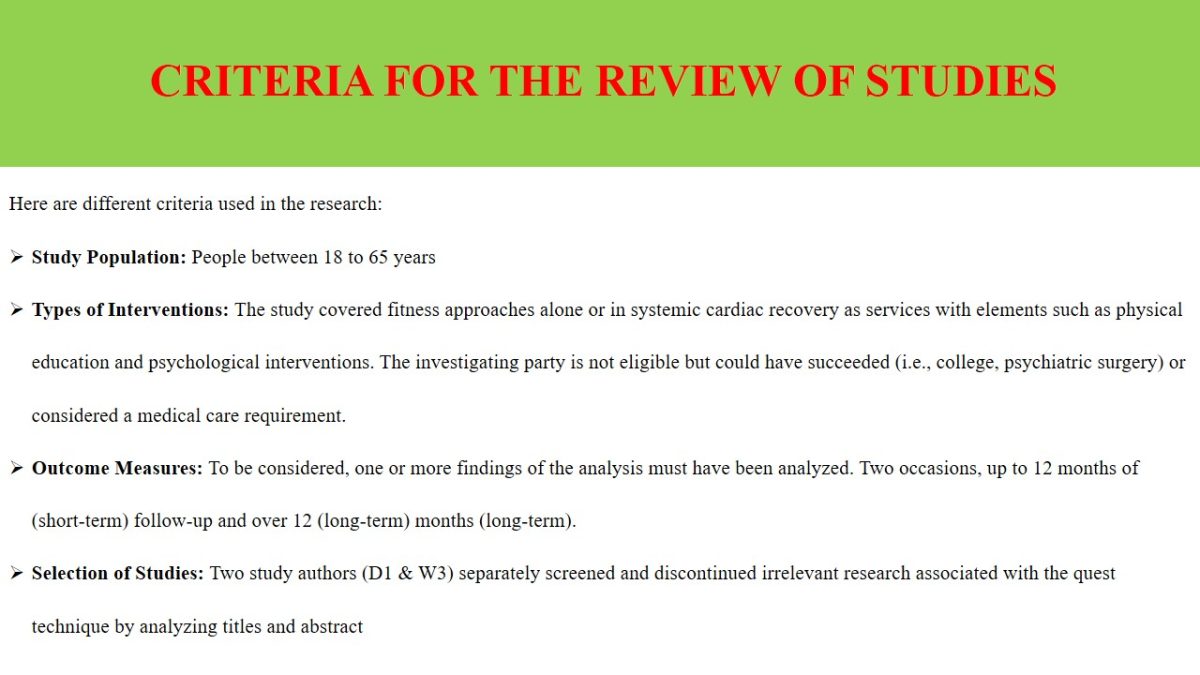
Findings
- 44 tests in total (75 publications).
- Inclusion of cardiac failure cases with retained expulsion.
- Definition of cardiac insufficiency with retained expulsion.
- The impact on hospital admissions of disease management programs.
- The effects on self-care of disease control programs.
In relation to instances that can cause heart failure, highlight the cases which comes as a result of cardiac failure.
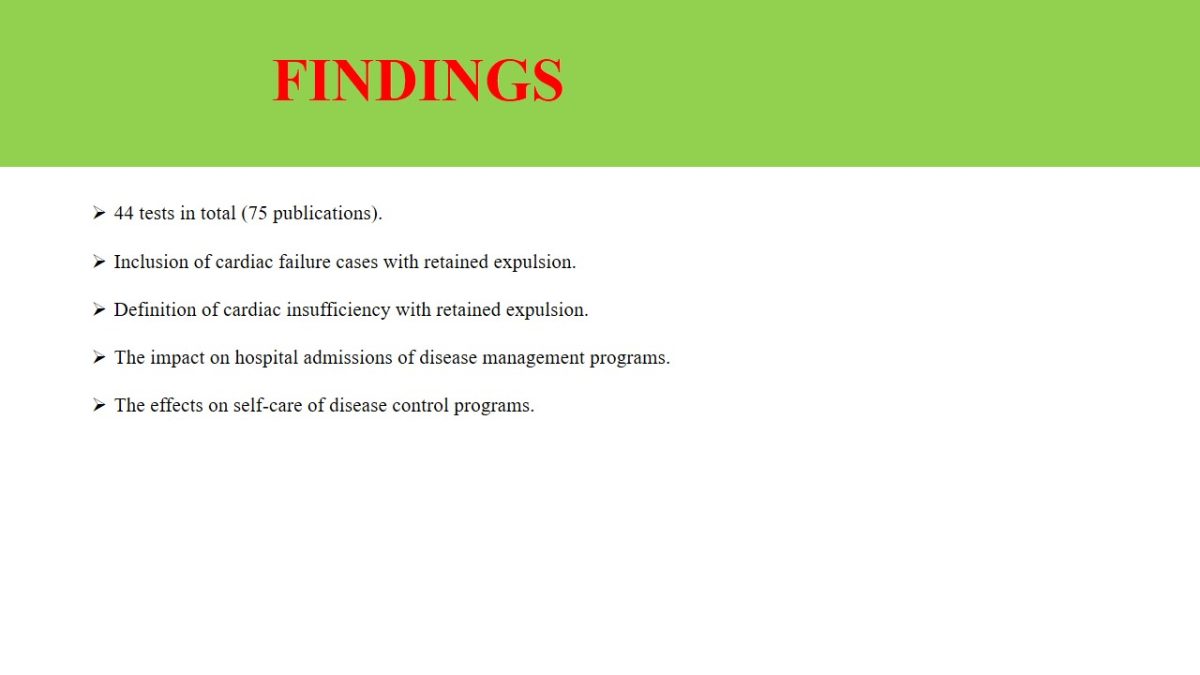
Discussion
- Automatic intervention to minimize the risk of heart defect-referred endpoint hospital admission alone and a slight increase in HRQoL relative to standard treatment.
- Both types of research contained instructional elements, actions, or self-help to improve self-management.
- There have been statistical changes to self-care in just three of 9 self-care trials.
- This finding can be explained by program characteristics, effect mechanisms, and efficacy evidence.
- There have been no consistent app features consistently providing a positive effect on the patient meta-analysis of 20 self-management assistance trials in heart failures (n=5624).
- A comprehensive analysis and a practical overview of the critical HF DMP pathways showed that successful programs could incorporate components in enhancing patients’ comprehension of HF, self-treatment, the involvement of family and caregiver, psychosocial stability, clinical care, and use of technology.
- The study was limited knowledge of optimal behaviors in life and self-care in HFpEF, and there is little evidence of the efficacy of self-care interventions for HFpEF.
Discuss the results and the analysis of the project, explain more about finding of the heart failure and the general knowledge.
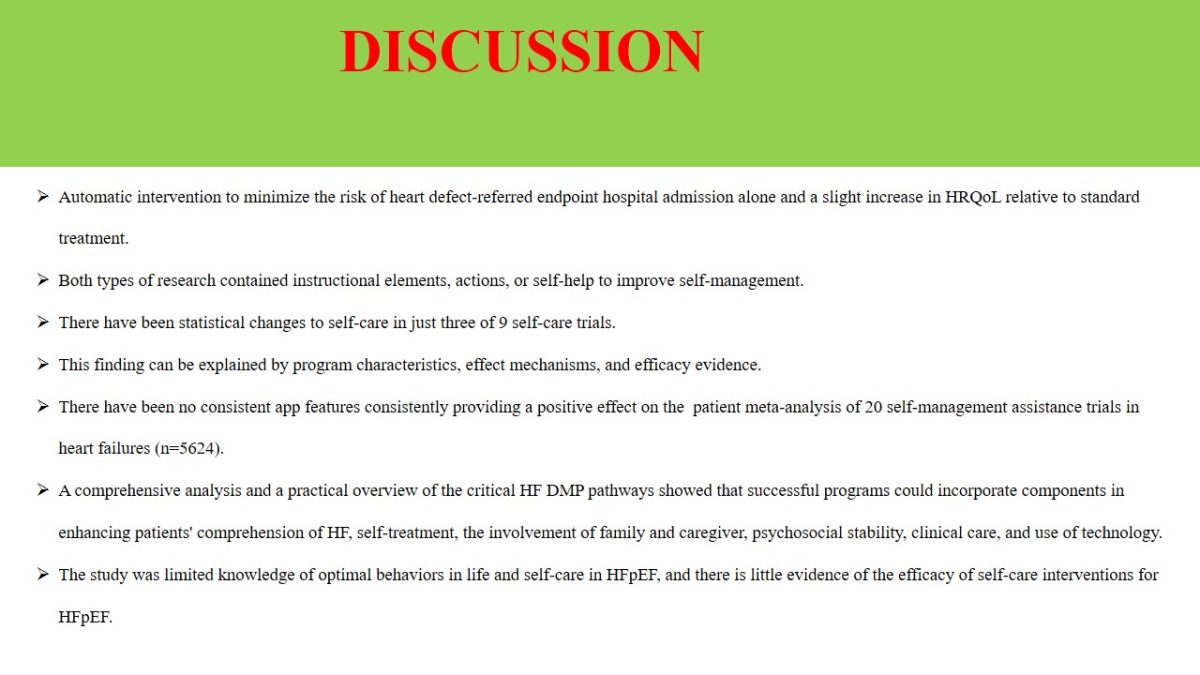
Limitation of the Study
- The differing and contradictory concept of HFpEF (some HFpEF samples).
- The heterogeneity and variance of research goals, treatments, calculated effects, and condition evaluation.
- The percentage of HFpEF of patients restricted our ability to compare trials, use meta-analysis, and draw specific results specifically.
- The proportion of HFpEF patients surpassed 50 percent in just six tests, although only four studies showed different HFpEF patients’ outcomes.
- The search technique could not have given satisfactory results because gray literature and articles were not included in languages other than Greek or English.
- The study team and participants who could support the intervention group couldn’t be blinded in DMPs.
- Lack of evidence for properly defined HFpEF leading to wrong interpretation of outcomes and conclusions.
Explain the variables which made the research difficult to undertake, and techniques which failed during the test samples.
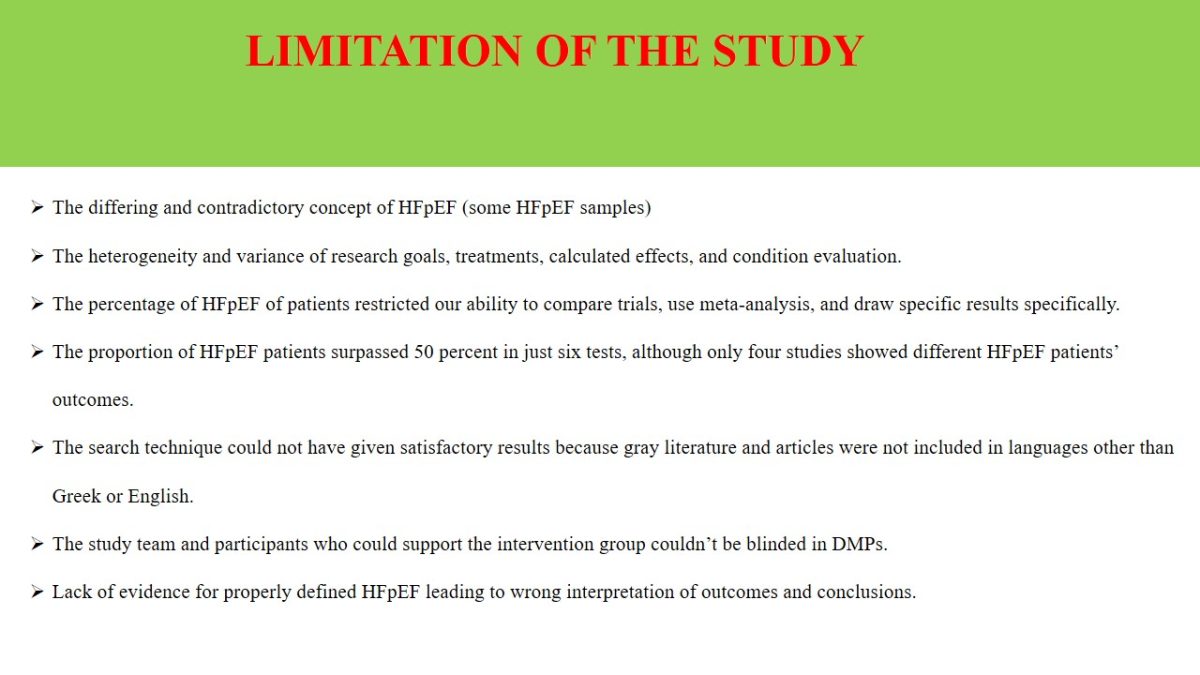
Conclusion
There is an important constraint in evaluating results, which do not indicate the impact of DMPs on patients, is a variable description of the HFpEF (including patients) used.
Evidence is insufficient to render substantive assumptions, but in terms of mortality, frequency of hospitalization, self-treatment, FR-knots, quality of life, fear, sleep, statistically related or positive trends were found.
Explain more about the importance of the results and the different measures a patient can take to overcome heart failure.
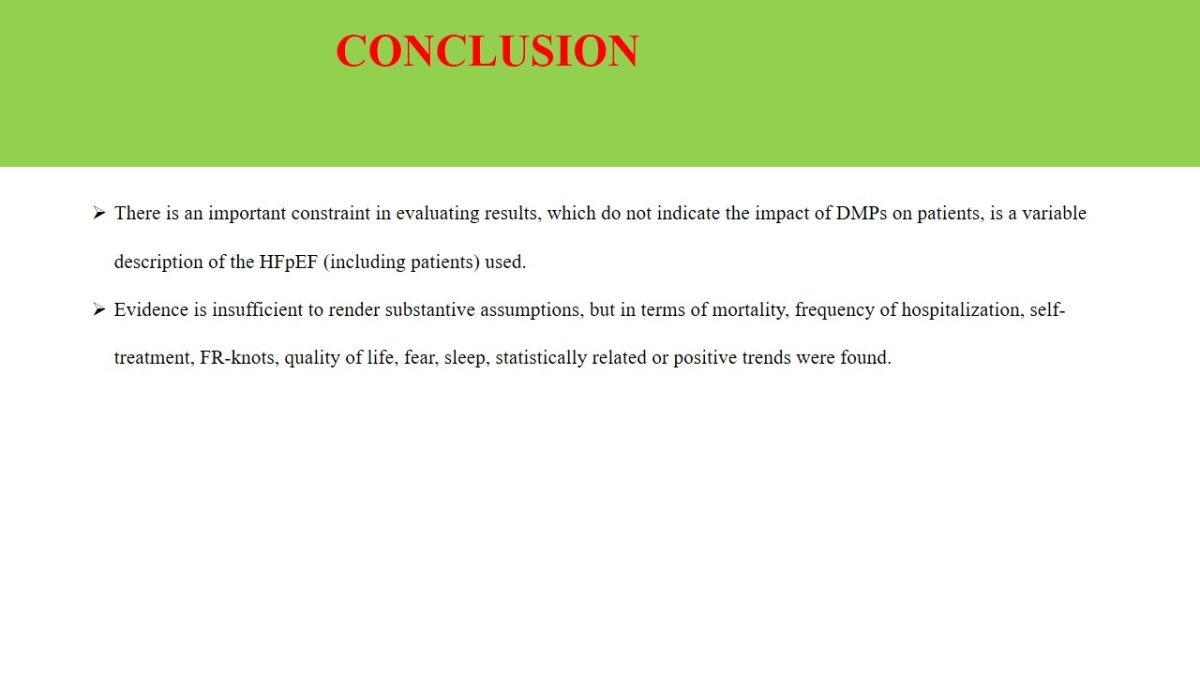
References
Andryukhin, A., Frolova, E., Vaes, B., & Degryse, J. (2010). The impact of a nurse-led care program on events and physical and psychosocial parameters in patients with heart failure with preserved ejection fraction: A randomized clinical trial in primary care in Russia. European Journal of General Practice, 16(4), 205-214. Web.
Bekelman, D. B., Allen, L. A., McBryde, C. F., Hattler, B., Fairclough, D. L., Havranek, E. P., Turvey, C., & Meek, P. M. (2018). Effect of a collaborative care intervention vs. usual care on patients’ health status with chronic heart failure. JAMA Internal Medicine, 178(4), 511. Web.
Bekelman, D. B., Plomondon, M. E., Carey, E. P., Sullivan, M. D., Nelson, K. M., Hattler, B., McBryde, C. F., Lehmann, K. G., Gianola, K., Heidenreich, P. A., & Rumsfeld, J. S. (2015). Primary results of the patient-centered disease management (PCDM) for heart failure study. JAMA Internal Medicine, 175(5), 725. Web.